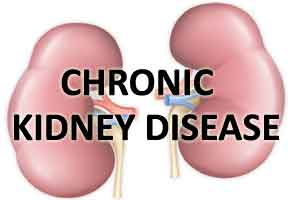- Home
- Editorial
- News
- Practice Guidelines
- Anesthesiology Guidelines
- Cancer Guidelines
- Cardiac Sciences Guidelines
- Critical Care Guidelines
- Dentistry Guidelines
- Dermatology Guidelines
- Diabetes and Endo Guidelines
- Diagnostics Guidelines
- ENT Guidelines
- Featured Practice Guidelines
- Gastroenterology Guidelines
- Geriatrics Guidelines
- Medicine Guidelines
- Nephrology Guidelines
- Neurosciences Guidelines
- Obs and Gynae Guidelines
- Ophthalmology Guidelines
- Orthopaedics Guidelines
- Paediatrics Guidelines
- Psychiatry Guidelines
- Pulmonology Guidelines
- Radiology Guidelines
- Surgery Guidelines
- Urology Guidelines
Roxadustat safe and effective for anemia correction in non-dialysis CKD patients

China: The treatment with roxadustat corrected anaemia in patients with chronic kidney disease (CKD) who were not undergoing dialysis, by significantly increasing the haemoglobin levels -- show results from a phase 3 trial conducted at 29 sites in China.
In the study, published in the New England Journal of Medicine (NEJM), roxadustat met its primary efficacy endpoint for anaemia correction in non-dialysis CKD patients.
Anaemia in CKD is associated with cardiovascular disease, hospitalization, cognitive impairment, and reduced quality of life, and has been shown consistently to be associated with an increased risk of mortality. It was treated only symptomatically with blood transfusions until 1989 when recombinant erythropoietin therapy was first approved. Erythropoiesis-stimulating agents can increase the haemoglobin levels of the patient to between 9 and 11 g per deciliter, resulting in a better quality of life and decreased mortality and left ventricular hypertrophy. Since then, erythropoiesis-stimulating agents with oral and intravenous iron has been the backbone of the treatment of chronic kidney disease accompanied by profound anaemia.
Roxadustat (FG-4592) is an oral inhibitor of hypoxia-inducible factor (HIF) prolyl hydroxylase that stimulates erythropoiesis and regulates iron metabolism.
Phase 2 studies showed that roxadustat increased levels of endogenous erythropoietin to within or near the physiologic range, along with increasing haemoglobin levels and improved iron homeostasis in CKD patients. However, it did not demonstrate the safety and efficacy of roxadustat for anaemia treatment in CKD patients not undergoing dialysis.
Chuanming Hao, Division of Nephrology, Huashan Hospital Fudan University, Shanghai, and colleagues determined the efficacy and safety of roxadustat treatment compared to placebo for anaemia in non-dialysis patients (NDD) with chronic kidney disease.
In this trial, conducted across 29 sites in China, the researchers randomly assigned 154 CKD patients to receive roxadustat or placebo three times a week for 8 weeks in a double-blind manner in the ratio 2:1. All the patients had a haemoglobin level of 7.0 to 10.0 g per deciliter at baseline. The randomized phase of the trial was followed by an 18-week open-label period in which all the patients (87 patients from the roxadustat group and 44 patients from the placebo group) received roxadustat; parenteral iron was withheld. The primary endpoint was the mean change from baseline in the haemoglobin level, averaged over weeks 7 through 9.
Also Read: Chronic kidney disease negatively impacts coronary revascularization outcomes: JACC Study
During the primary-analysis period (First 8 Weeks):
- The mean (±SD) change from baseline in the haemoglobin level was an increase of 1.9±1.2 g per deciliter in the roxadustat group and a decrease of 0.4±0.8 g per deciliter in the placebo group.
- The mean reduction from baseline in the hepcidin level (associated with greater iron availability) was 56.14±63.40 ng per millilitre in the roxadustat group and 15.10±48.06 ng per millilitre in the placebo group.
- The reduction from baseline in the total cholesterol level was 40.6 mg per deciliter in the roxadustat group and 7.7 mg per deciliter in the placebo group.
- Hyperkalemia and metabolic acidosis occurred more frequently in the roxadustat group than in the placebo group.
- The efficacy of roxadustat in haemoglobin correction and maintenance was maintained during the 18-week open-label period.
Open-Label Phase (Weeks 9 through 26)
- In those patients initially randomized to the roxadustat group (n=87), efficacy was maintained.
- The mean haemoglobin at Weeks 23-27 was maintained at +1.9 g/dL above baseline, and 84% of those patients achieved haemoglobin ≥11.0 g/dL during the 26-week treatment period.
- In those patients crossed over from the placebo group (n=44), anaemia correction was demonstrated by achieving a 2.0 g/dL increase in haemoglobin from baseline averaged over Weeks 23-27, with 72% of the patients achieving haemoglobin ≥11.0 g/dL during the treatment period.
Also Read: Premature birth linked to increased risk of chronic kidney disease into later life
Among Chinese patients with CKD who did not undergo dialysis those in the roxadustat group had a higher mean haemoglobin level than those in the placebo group after 8 weeks. During the 18-week open-label phase of the trial, roxadustat was associated with continued efficacy.

Disclaimer: This site is primarily intended for healthcare professionals. Any content/information on this website does not replace the advice of medical and/or health professionals and should not be construed as medical/diagnostic advice/endorsement or prescription. Use of this site is subject to our terms of use, privacy policy, advertisement policy. © 2020 Minerva Medical Treatment Pvt Ltd